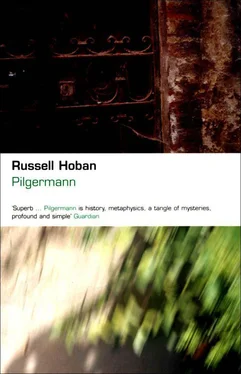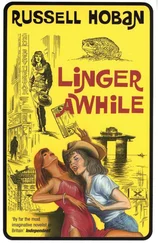Russell Hoban - Pilgermann
Здесь есть возможность читать онлайн «Russell Hoban - Pilgermann» весь текст электронной книги совершенно бесплатно (целиком полную версию без сокращений). В некоторых случаях можно слушать аудио, скачать через торрент в формате fb2 и присутствует краткое содержание. Год выпуска: 2002, Издательство: Bloomsbury Publishing PLC, Жанр: Современная проза, на английском языке. Описание произведения, (предисловие) а так же отзывы посетителей доступны на портале библиотеки ЛибКат.
- Название:Pilgermann
- Автор:
- Издательство:Bloomsbury Publishing PLC
- Жанр:
- Год:2002
- ISBN:нет данных
- Рейтинг книги:5 / 5. Голосов: 1
-
Избранное:Добавить в избранное
- Отзывы:
-
Ваша оценка:
- 100
- 1
- 2
- 3
- 4
- 5
Pilgermann: краткое содержание, описание и аннотация
Предлагаем к чтению аннотацию, описание, краткое содержание или предисловие (зависит от того, что написал сам автор книги «Pilgermann»). Если вы не нашли необходимую информацию о книге — напишите в комментариях, мы постараемся отыскать её.
Pilgermann — читать онлайн бесплатно полную книгу (весь текст) целиком
Ниже представлен текст книги, разбитый по страницам. Система сохранения места последней прочитанной страницы, позволяет с удобством читать онлайн бесплатно книгу «Pilgermann», без необходимости каждый раз заново искать на чём Вы остановились. Поставьте закладку, и сможете в любой момент перейти на страницу, на которой закончили чтение.
Интервал:
Закладка:
The shaking of the earth stops, the grey light of the day is once more steady. There are cracks in the walls, cracks in streets and houses, fallen bricks and stones here and there but no serious damage and no one killed as far as we know. Bembel Rudzuk and I go to Hidden Lion. The tower stands intact and unmarred and the pattern has suffered no damage whatever although there are cracks in the streets all around and in the nearby shops and houses. ‘Its time is not yet come,’ says Bembel Rudzuk.
When we look at Hidden Lion now it is difficult to recall the feelings we had when the pattern was first assembled. Now Bembel Rudzuk’s idea of observing ‘that point at which stillness becomes motion’ and that other point ‘at which pattern becomes consciousness’ seems altogether ill-conceived and the words with which he described his intention make me shudder. When I call to mind those early days of Hidden Lion when the tiles were arriving from Tower Gate’s brickyard and his foreman and workmen were with their swift and dancing movements putting the pattern together, when I remember how we walked about and viewed the expansion of those tawny and red and black triangles with a commanding eye as if we were in charge of the thing, I cannot help making a face of embarrassment.
As we stand there looking at Hidden Lion I find myself shaking my head; I no longer know how to approach this place in my mind, I no longer know what to think of it. Up until the time when the Syrian and Armenian Christians were beheaded it was everybody’s good-luck place; afterwards I expected it to become a bad-luck place but I was wrong. Until the next rain the bloodstains remained to mark the tiles, and to those tiles during those few days came many people who stood and looked at them and pointed them out to other people who then stood and looked at them. All of these people who came and looked were Muslims. One day I saw a man squat and rub his hand over one of the tawny bloodstained tiles, then he put his hand inside his robe and rubbed his chest. After that many others did the same, and children began to walk in special ways on those tiles and to dance on them.
The tiles being glazed, the blood had not permeated the clay; when the rain came it washed them clean. The tiles that had been stained with blood did not, however, become unknown: by some general understanding amongst themselves those who took an interest in the tiles had noted their positions relative to the tower, and by counting carefully they found their way to them again. This was a source of great amusement to the headless and maggoty tax-collector, who now appointed himself a guide and would stand where the blood had been, stamping his foot and pointing with his finger to the tiles. I could of course not see his smile but I could hear his laughter and there was no mistaking the mockery in the way he stamped his foot and pointed with his finger.
One day a boy of eight or nine came and prostrated himself on some of the tiles that had been stained with blood. He was dressed the same as any other child, he was not wearing a blue turban. I recognized him as the same boy who had come to the paved square and drawn on the stone the morning after I made my first chalk drawing for Hidden Lion. After a few moments he stood up and looked all around at everyone, then walked away. The next day there appeared on those tiles an earthenware pot which filled up with money. The butcher volunteered to divide it among Christian orphans. This was done, and each day after that the pot was filled up and emptied in the same manner.
Now on this day of the shaking of the earth the shaking has stopped and people are returning to their ordinary activities; the stallholders are again at their places on Hidden Lion. Trade here has of course diminished with the progress of the siege; the caravans have left off coming to Antioch, the road from Suwaydiyya is dangerous, and goods are scarce. Vendors, having little to sell, have lately been reduced to trading among themselves; their collective scanty stock distributes itself anew every day: the copper pot with the hole in it that used to be at the stall of A makes its appearance at the stall of B, while the haftless dagger that was a veteran non-seller with B now tries its luck with A. Eventually, perhaps with P or Q, the pot and the dagger assume with the new venue a new aspect that gets them sold, proving yet again to those who knew it already that action creates action.
Today, however, the merchants sit or stand listlessly by their wares as if all buying and selling are gone out of the world. Most of them pack up and go home early. The man at the coffee stand by the tower puts his coffee pot and his little brass cups into their wooden box, picks up the box by its leather strap, slings it from his shoulder, takes his brazier, says, This place is finished’, and turns to go.
‘Why is it finished?’ I ask him.
‘Look,’ he says, pointing to the pattern with his foot, ‘there’s not so much as a single tile cracked, it isn’t natural.’
‘What do you think it means?’ I say.
‘It means that this place is being saved for something worse,’ he says, ‘and I don’t want any part of it.’ He recedes into the distance, never looking back.
The butcher comes, takes the pot of money for the Christian orphans, spits on the tiles, and walks away.
‘Wait,’ I say to him. ‘Why did you spit on the tiles, why do you look that way?’
Without saying a word the butcher makes with his index and little finger the sign against the evil eye and off he goes.
This day that has begun with the shaking of the earth moves on and there are more wonders to be seen: the dreadful grey curtain of the day becomes the darker curtain of night and there are seen moving behind it strange red lights in the sky that shift and slide from one shape to another. More praying and singing from the Franks and many voices lifted to God on our side of the walls as well. The Patriarch, who was taken out of his hanging cage and put back in prison when the earth stopped shaking, is brought out again to offer an opinion on the strange lights. He sees very plainly in the sky the sign of the Cross and is put back in prison. Bembel Rudzuk and I look up at the sky but we say nothing to each other of what we see — there is perhaps too much motion becoming stillness, too much consciousness becoming pattern for us to respond with anything but silence.
The sky stays grey the next day and rain comes pelting down like hopelessness turned into water; the earth becomes a soggy boggy mire; the river swallows up its banks, it is no longer to be trifled with, soon it must run over the bridge instead of under it, soon it must lose patience with this city, must rush it brick by brick and stone by stone away into the sea that drowns Muslims, Christians, and Jews impartially and says nothing about God, nothing about justice or mercy. Dismally falls the rain on Silpius, and slides of mud and stones go down the mountainside to join the ponderous rolling rush of Onopniktes that bellows and echoes under Antioch as if fulfilling a prophecy, as if it has been foretold centuries ago that when the mountain will have passed under the city a monstrous thing will happen, perhaps the end of all things will come; or worse, some great beast taller than the mountain will appear and say at the same time and with one voice in all the languages of humankind that there will be no end to anything, that everything will go on and on for ever.
Those thousands of Franks who rode off in the night come squelching back now under the grey sky and the rain. These thousands, we hear, have been led by Bohemond of Taranto and Robert of Flanders. Moving up the Orontes valley they have run into the armies of Duqaq, Tughtagin, and Janah al-Dawla coming from Damascus to relieve Antioch. We are told that Bohemond has learned how to fight Turks now, that he kept his cavalry in the rear to prevent the encirclement of Robert’s men and then charged in at the right moment. So they have driven back the Turks, Bohemond and Robert and their thousands; they have won a battle but they have lost men, they have worn themselves out, and they have come back empty-handed to their rotting and sodden tents in the mud and such treats as horses’ heads without the tongues for three solidi and goats’ intestines for five.
Читать дальшеИнтервал:
Закладка:
Похожие книги на «Pilgermann»
Представляем Вашему вниманию похожие книги на «Pilgermann» списком для выбора. Мы отобрали схожую по названию и смыслу литературу в надежде предоставить читателям больше вариантов отыскать новые, интересные, ещё непрочитанные произведения.
Обсуждение, отзывы о книге «Pilgermann» и просто собственные мнения читателей. Оставьте ваши комментарии, напишите, что Вы думаете о произведении, его смысле или главных героях. Укажите что конкретно понравилось, а что нет, и почему Вы так считаете.












